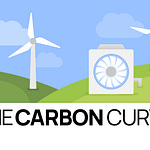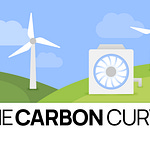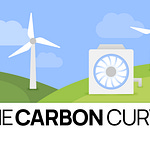Episode 12 of The Carbon Curve is with Adrian Corless, CEO and CTO of CarbonCapture Inc.
This episode is sponsored by Carbonfuture.
Carbonfuture is an end-to-end platform for companies who want to participate in removing carbon from the atmosphere. Unlike conventional marketplaces, Carbonfuture’s monitoring, reporting, and verification platform solves carbon credit uncertainty for buyers like Microsoft and SwissRe while Carbonfuture’s support helps scale the world’s most promising carbon removal ventures for real climate impact.
About this episode:
In early September, direct air capture (DAC) company CarbonCapture announced plans to build a massive new DAC facility in Wyoming. CarbonCapture and its storage partner expect this project to permanently remove five million tons of CO2 from the atmosphere every year by 2030. It would also be the first DAC deployment to use Class VI wells for permanent CO2 storage.
A few things stood out to me about this announcement. First, the scale. This is the largest DAC facility ever announced. I wanted to dig deeper on the company’s proposed modular approach to build up to its massive 5 million ton per year target capacity by 2030. Second, the announcement specifically referenced the Inflation Reduction Act. I wanted to learn more about how policy was a catalyst in this company’s major decision to move forward with a project of this size. And finally, I was curious about CarbonCapture’s partnerships with The State of Wyoming and Frontier Carbon Solutions. I wanted to hear more about how strategic partnerships translate into on the ground deployments of new carbon removal (or CDR) projects.
So to answer these questions, I speak to CarbonCapture’s CEO and CTO about what it’s actually going to take, between now and 2030, from technology, policy, partnerships, and carbon markets to realize their ambitious plan - and what comes next.
In this episode, Na’im and Adrian discuss:
CarbonCapture’s origin story
What make’s CarbonCapture unique and scalable, including its modular approach, open systems architecture, and project deployment model (and what about the company’s solution is still being worked out)
Roll-out plans for Project Bison, the company’s 5 million ton per year DAC plant in Wyoming and its partnership with Frontier Carbon Solutions
The challenges and opportunities with Class VI wells for CO2 storage, and Adrian’s views on Enhanced Oil Recovery (EOR)
What made Wyoming an attractive location for Project Bison, what recent policies helped spur this project launch, and how government procurement can be an important bridge to scaling up CDR
Recent steps taken that could make Canada an attractive destination for DAC deployment, and how CarbonCapture envisions expanding beyond North America
How the Inflation Reduction Act changed the economics of using DAC-sourced CO2 in the production of sustainable aviation fuels
Relevant links:
The world’s largest carbon removal project yet is headed for Wyoming (The Verge)
Storage partner Frontier Carbon Solutions
My recent report on decarbonizing aviation with Clean Air Task Force, which includes a discussion on the potential role for DAC
About Adrian Corless:
Adrian has spent more than 25 years developing and commercializing products in the cleantech industry. From 2013 to 2018, he was the CEO of Carbon Engineering, where he successfully developed the company into a recognized global leader in CO2 direct air capture, piloting industrial scale systems in under two years. In addition, Adrian has spent 15+ years commercializing industrial hydrogen, fuel cell, and pump technologies, serving as CEO of Rotoliptic Technologies, CTO of Plug Power, and CTO of Cellex Power Products. He holds a Master's of Science degree from the University of Victoria, BC Canada with specialization in Energy Systems, Cryogenics, and LNG.
Na’im Merchant, Founder and Managing Director of Carbon Curve, is an advisor and thought partner to start-ups, policy groups, and research organizations on scaling up climate technologies to meet the monumental challenge of removing billions of tons of CO2 from the atmosphere. Every week, Na’im will release a short interview with individuals advancing bold new ideas and taking a collective action approach to scaling up carbon removal.











